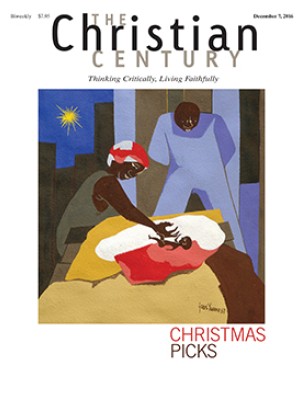Agrarian agape
Ecological theologian Norman Wirzba, who has written widely on food and faith, here offers a rich encomium to Christian love. Wirzba, who teaches at Duke, labors to reclaim as central to Christianity the bold statement found in John’s first epistle: “Whoever does not love does not know God, for God is love” (1 John 4:8). This keystone assertion is both fresh and traditional, like a river of life ready to renew the parched plains of postmodernism.
That the teaching and practice of Christian love has been displaced by dogmatic and exclusionary condemnation is not a new critique. Wirzba offers it because he argues that it is relevant to what he calls “the crisis in the church today,” a judgment he does not belabor. The rejection of Christianity because it is seen as a source of pain and exclusion is best answered by the practice of love: “Christianity is best understood as a training ground in the ways of love,” he writes. Christianity’s most persuasive apologetic is presented by acts of love, modeled first in the words and acts of Jesus but also in the lives of others. Wirzba narrates some contemporary examples drawn from the actions of those whose practices of compassion and reconciliation have been exemplary, such as Marguerite Barankitse, a Tutsi from Burundi who came to care for thousands of children after the genocidal massacres of Hutu and Tutsi peoples in 1993.
Read our latest issue or browse back issues.
A skilled theologian, Wirzba deploys love as a lens through which readers can review the central Christian stories of creation, fall, redemption, and heaven. Creation is God’s free gift, and all that exists has come into being because “God loves it to be,” Wirzba writes memorably. Creation is love made material, a view that harmonizes with Wirzba’s ecological theology in which God’s abundant hospitality comprises the earth’s meaning and value.
All theologians who emphasize God’s loving character face the challenge of theodicy: how to account for willful sin. Sin makes no sense; why ruin a good and perfect thing? Wirzba argues that sin is a corruption of love and refusal of restraint, as the story of Adam and Eve’s eating from the tree of knowledge of good and evil signifies. Adam and Eve exploit their freedom and in so doing come to refuse intimacy with God and become ashamed. Similarly, much of the world’s pain and suffering comes from humans’ distorted appetite, which exploits God’s gift of the earth and its goods. This understanding of sin’s origins also dovetails with Wirzba’s emphasis on God’s material generosity.
If love is the fount of the universe, it is also medicine for healing. As the Gospels testify in their many stories of miracles, Jesus is the great physician, healer of bodies, hearts, and all of creation, knowing “what creatures need to thrive.” In this portion of his comprehensive retelling of the Christian story, Wirzba rarely uses the term redemption but instead speaks of health, community, and transformation, often citing the language of Paul in Romans, Galatians, and Corinthians. Love is manifest not only in Jesus but also in community life, where love is—or should be—taught and practiced.
Wirzba’s recentering of Christianity on love produces a particularly encouraging eschatology. Talk of heaven is certainly out of fashion in mainline liberal theology, while conservative and literally childish views of the afterlife have been presented in best-selling books. In keeping with his positive materialism, Wirzba asserts the resurrection of the body (the mechanics of which “are simply beyond our intellectual reach”). Heaven is not a place where Jesus rides a pony with a rainbow mane, but a post-time time of full participation in love’s way of life.
For Wirzba, the book of Revelation describes a new and ecologically healed earth where God is at home. His view of heaven is an adult view that Christians can embrace rather than discard as superstitious or socially irresponsible escapism. And his interweaving of heaven and perfect love calls to my mind the exalted image of God with which Dante closes the Paradiso of his Divine Comedy: “the Love that moves the sun and the other stars.”
Wirzba’s other books are sometimes dry in tone. Here his prose is simpler, more inspired, and preacherly. That may reflect the book’s origins in a course Wirzba taught, or an editorial goal of reaching general readers as well as seminary students. In any event his writing is blessedly clear and especially resonant whenever he discusses creation, a subject close to his ecological heart. “God plants the world,” he writes. Wirzba’s beautiful apologetic grounds Christianity in love’s fertile soil.







